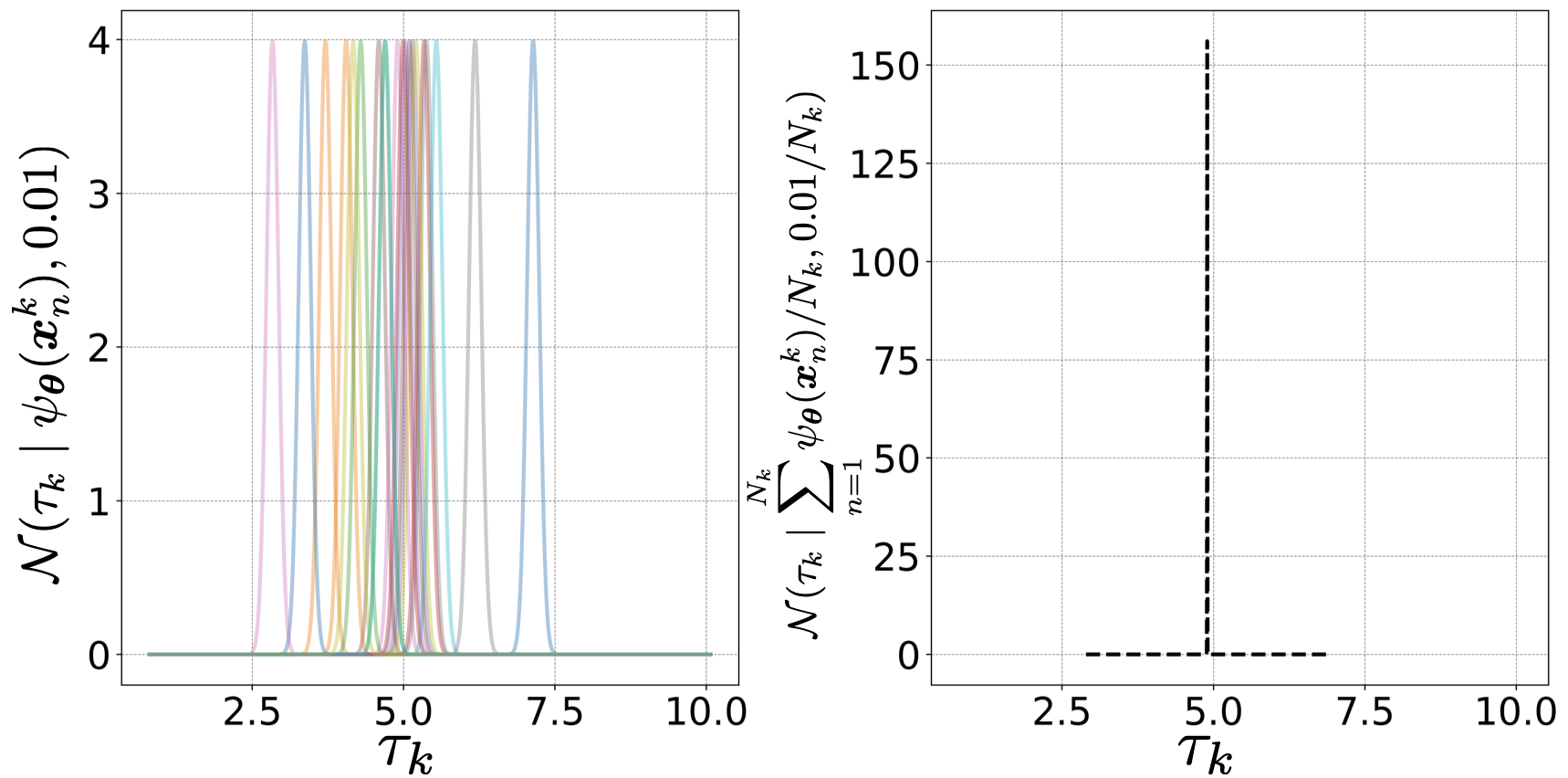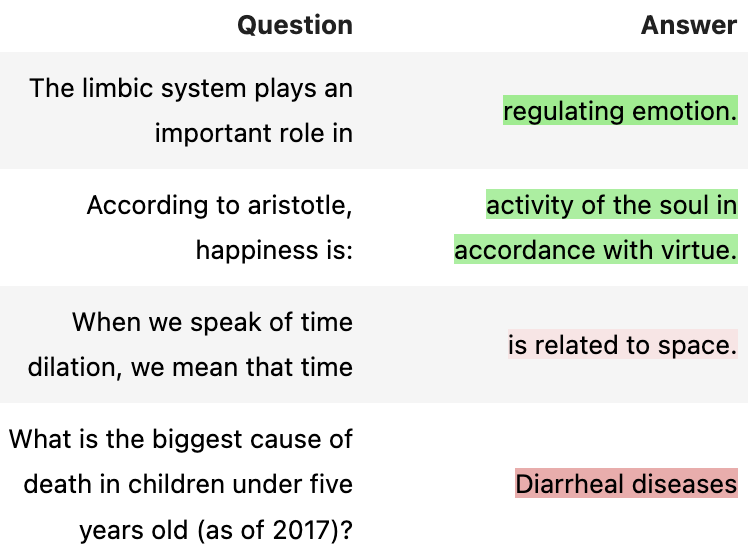Thermometer: Towards Universal Calibration for Large Language Models
2403.08819

1
0

Abstract
We consider the issue of calibration in large language models (LLM). Recent studies have found that common interventions such as instruction tuning often result in poorly calibrated LLMs. Although calibration is well-explored in traditional applications, calibrating LLMs is uniquely challenging. These challenges stem as much from the severe computational requirements of LLMs as from their versatility, which allows them to be applied to diverse tasks. Addressing these challenges, we propose THERMOMETER, a calibration approach tailored to LLMs. THERMOMETER learns an auxiliary model, given data from multiple tasks, for calibrating a LLM. It is computationally efficient, preserves the accuracy of the LLM, and produces better-calibrated responses for new tasks. Extensive empirical evaluations across various benchmarks demonstrate the effectiveness of the proposed method.
Create account to get full access
Overview
- This paper introduces "Thermometer," a novel method for calibrating large language models (LLMs) to produce well-calibrated confidence scores.
- The researchers demonstrate that Thermometer outperforms existing calibration techniques on a range of downstream tasks, including sentiment analysis, natural language inference, and question answering.
- The paper also explores the ability of Thermometer to mitigate biases in LLM outputs and discusses the implications for responsible AI development.
Plain English Explanation
Large language models (LLMs) like GPT-3 and BERT have become incredibly powerful at a wide range of natural language processing tasks. However, these models often struggle to produce well-calibrated confidence scores, meaning their predictions may not accurately reflect the true likelihood of being correct.
The Thermometer method proposed in this paper aims to address this issue. The key idea is to train the model to not just predict the output, but also to predict how confident it should be in that output. This allows the model to better estimate the uncertainty in its own predictions, leading to more reliable confidence scores.
The researchers show that Thermometer outperforms existing calibration techniques across a variety of language tasks. This is important because well-calibrated confidence scores are essential for many real-world applications, such as medical diagnosis or financial decision-making, where the model's uncertainty needs to be properly conveyed.
The paper also investigates how Thermometer can help mitigate biases in LLM outputs. Since these models are trained on large, diverse datasets, they can sometimes reflect and amplify societal biases. The Thermometer approach appears to help reduce the impact of these biases, making the model's predictions more fair and unbiased.
Overall, this research represents an important step towards making large language models more reliable and trustworthy, which is crucial as these models become increasingly ubiquitous in our lives. By improving confidence calibration and bias mitigation, the Thermometer method could help unlock the full potential of LLMs for a wide range of beneficial applications.
Technical Explanation
The key innovation in this paper is the Thermometer calibration method, which the researchers develop and evaluate on a range of language tasks. Thermometer works by training the LLM to not just predict the output, but also to predict a "temperature" value that represents the model's confidence in that output.
This temperature value is then used to scale the model's logits (the raw, pre-softmax outputs) to produce well-calibrated probability estimates. The researchers show that this approach outperforms existing calibration techniques like temperature scaling and mixup-based methods, particularly on out-of-distribution and adversarial examples.
The paper also investigates Thermometer's ability to mitigate biases in LLM outputs. By training the model to be aware of its own confidence and uncertainty, the Thermometer approach appears to reduce the impact of societal biases that can be present in the training data. This is an important finding, as bias mitigation is a crucial challenge in the responsible development of large language models.
The researchers evaluate Thermometer on a diverse set of language tasks, including sentiment analysis, natural language inference, and question answering. The results demonstrate the versatility and effectiveness of the method, suggesting it could be a valuable tool for improving the reliability and fairness of LLMs across a wide range of applications.
Critical Analysis
The Thermometer paper presents a well-designed and thorough investigation of the proposed calibration method. The researchers have made a convincing case for the merits of their approach, particularly in terms of its ability to outperform existing techniques and mitigate biases in LLM outputs.
That said, the paper does not address some potential limitations or areas for further research. For example, the impact of Thermometer on model performance and computational complexity is not fully explored. It would be valuable to understand how the additional temperature prediction task affects the model's overall inference speed and memory footprint, as these factors are critical in many real-world deployment scenarios.
Additionally, the paper focuses on evaluating Thermometer on standard benchmark tasks, but does not investigate its performance on more specialized or domain-specific applications. It would be interesting to see how the method fares in scenarios where the training and evaluation data have greater distributional shift, or where the consequences of miscalibrated confidence are particularly high (e.g., in medical or financial decision-making).
Finally, while the bias mitigation results are promising, the paper does not provide a deep analysis of the types of biases being addressed or the underlying mechanisms by which Thermometer achieves this. A more detailed exploration of these aspects could lead to further insights and improvements in bias-aware model calibration.
Overall, the Thermometer paper represents an important contribution to the field of large language model calibration and bias mitigation. However, there are still opportunities for further research and refinement to unlock the full potential of this approach.
Conclusion
The Thermometer paper introduces a novel calibration method that significantly improves the reliability of confidence scores produced by large language models. By training the models to predict both the output and a corresponding "temperature" value, Thermometer achieves superior performance compared to existing calibration techniques, particularly on out-of-distribution and adversarial examples.
Moreover, the paper's findings suggest that the Thermometer approach can help mitigate biases in LLM outputs, making the models' predictions more fair and unbiased. This is a crucial capability as these powerful language models become more widespread and integrated into high-stakes decision-making processes.
While the paper presents a strong foundation, there are still opportunities for further research to address potential limitations and expand the application of Thermometer to more specialized domains. Nevertheless, this work represents an important step towards developing large language models that are more trustworthy and reliable, with significant implications for the responsible development and deployment of these transformative technologies.
This summary was produced with help from an AI and may contain inaccuracies - check out the links to read the original source documents!
Related Papers

An Empirical Study Into What Matters for Calibrating Vision-Language Models
Weijie Tu, Weijian Deng, Dylan Campbell, Stephen Gould, Tom Gedeon

0
0
Vision-Language Models (VLMs) have emerged as the dominant approach for zero-shot recognition, adept at handling diverse scenarios and significant distribution changes. However, their deployment in risk-sensitive areas requires a deeper understanding of their uncertainty estimation capabilities, a relatively uncharted area. In this study, we explore the calibration properties of VLMs across different architectures, datasets, and training strategies. In particular, we analyze the uncertainty estimation performance of VLMs when calibrated in one domain, label set or hierarchy level, and tested in a different one. Our findings reveal that while VLMs are not inherently calibrated for uncertainty, temperature scaling significantly and consistently improves calibration, even across shifts in distribution and changes in label set. Moreover, VLMs can be calibrated with a very small set of examples. Through detailed experimentation, we highlight the potential applications and importance of our insights, aiming for more reliable and effective use of VLMs in critical, real-world scenarios.
6/17/2024
🔮
On the Calibration of Multilingual Question Answering LLMs
Yahan Yang, Soham Dan, Dan Roth, Insup Lee

0
0
Multilingual pre-trained Large Language Models (LLMs) are incredibly effective at Question Answering (QA), a core task in Natural Language Understanding, achieving high accuracies on several multilingual benchmarks. However, little is known about how well their confidences are calibrated. In this paper, we comprehensively benchmark the calibration of several multilingual LLMs (MLLMs) on a variety of QA tasks. We perform extensive experiments, spanning encoder-only, encoder-decoder, and decoder-only QA models (size varying from 110M to 7B parameters) and diverse languages, including both high- and low-resource ones. We study different dimensions of calibration in in-distribution, out-of-distribution, and cross-lingual transfer settings, and investigate strategies to improve it, including post-hoc methods and regularized fine-tuning. For decoder-only LLMs such as LlaMa2, we additionally find that in-context learning improves confidence calibration on multilingual data. We also conduct several ablation experiments to study the effect of language distances, language corpus size, and model size on calibration, and how multilingual models compare with their monolingual counterparts for diverse tasks and languages. Our experiments suggest that the multilingual QA models are poorly calibrated for languages other than English and incorporating a small set of cheaply translated multilingual samples during fine-tuning/calibration effectively enhances the calibration performance.
4/16/2024

Calibrated Large Language Models for Binary Question Answering
Patrizio Giovannotti, Alexander Gammerman

0
0
Quantifying the uncertainty of predictions made by large language models (LLMs) in binary text classification tasks remains a challenge. Calibration, in the context of LLMs, refers to the alignment between the model's predicted probabilities and the actual correctness of its predictions. A well-calibrated model should produce probabilities that accurately reflect the likelihood of its predictions being correct. We propose a novel approach that utilizes the inductive Venn--Abers predictor (IVAP) to calibrate the probabilities associated with the output tokens corresponding to the binary labels. Our experiments on the BoolQ dataset using the Llama 2 model demonstrate that IVAP consistently outperforms the commonly used temperature scaling method for various label token choices, achieving well-calibrated probabilities while maintaining high predictive quality. Our findings contribute to the understanding of calibration techniques for LLMs and provide a practical solution for obtaining reliable uncertainty estimates in binary question answering tasks, enhancing the interpretability and trustworthiness of LLM predictions.
7/2/2024

Multicalibration for Confidence Scoring in LLMs
Gianluca Detommaso, Martin Bertran, Riccardo Fogliato, Aaron Roth

0
0
This paper proposes the use of multicalibration to yield interpretable and reliable confidence scores for outputs generated by large language models (LLMs). Multicalibration asks for calibration not just marginally, but simultaneously across various intersecting groupings of the data. We show how to form groupings for prompt/completion pairs that are correlated with the probability of correctness via two techniques: clustering within an embedding space, and self-annotation - querying the LLM by asking it various yes-or-no questions about the prompt. We also develop novel variants of multicalibration algorithms that offer performance improvements by reducing their tendency to overfit. Through systematic benchmarking across various question answering datasets and LLMs, we show how our techniques can yield confidence scores that provide substantial improvements in fine-grained measures of both calibration and accuracy compared to existing methods.
4/9/2024